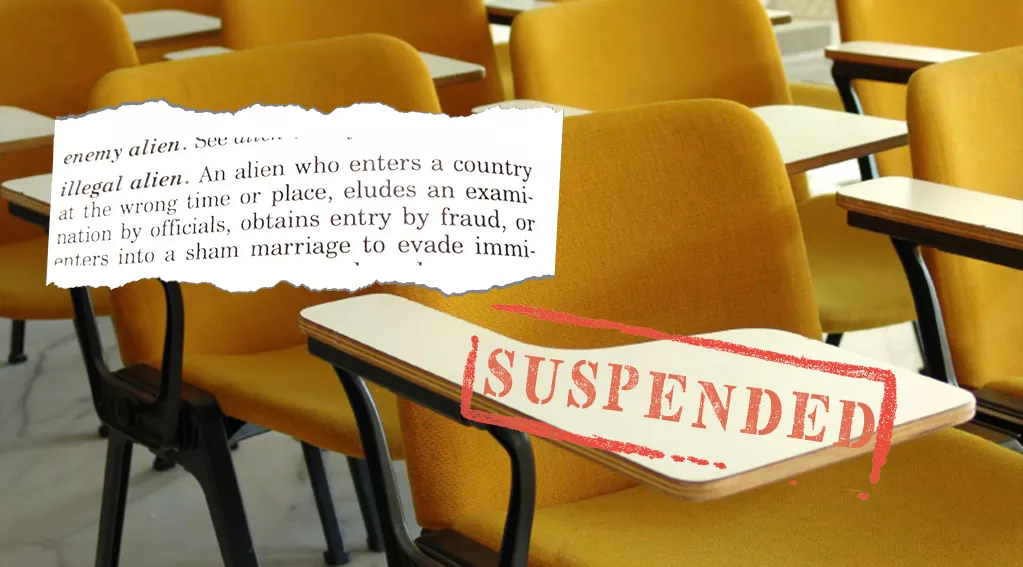By Hannah Davis
FAIR
Christian McGhee, a sixteen-year-old student at Central Davidson High School in Lexington, North Carolina, was recently suspended for using the term “illegal alien” during his English class. The incident took place on April 9th, when Christian’s teacher assigned the class vocabulary words, one of which was “alien.” Christian sought clarification on the word’s intended usage by asking, “Like space aliens or illegal aliens without green cards?”
Instead of answering the question, his teacher took the matter to the assistant principal since one of Christian’s classmates became offended and threatened to fight Christian. The assistant principal suspended Christian for three days, declaring that the student’s words were offensive and disrespectful to his Hispanic peers. The student threatening actual violence was never reprimanded.
In his own defense, Christian told reporters, “I didn’t make a statement directed towards anyone; I asked a question. I wasn’t speaking of Hispanics because everyone from other countries needs green cards, and the term “illegal alien” is an actual term that I hear on the news and can find in the dictionary.”
Indeed, the phrase “illegal alien” is a long-recognized term that refers to any person who is present in the United States but has no legal status, such as a tourist visa, a green card, or, naturally, U.S. citizenship. The Immigration Reform and Control Act (IRCA) codified this term in 1986. It was again codified in the Illegal Immigration Reform and Immigrant Responsibility Act (IIRIRA) in 1996. The Supreme Court has consistently used “illegal alien” in its opinions. Even U.S. presidents regularly used the term, including President Bill Clinton who mentioned “illegal aliens” in his 1995 State of the Union address and in official memoranda. “Alien” is defined in federal statute to refer to “any person not a citizen or national of the United States.”
Christian’s mother, Leah McGhee, is worried that her son’s three-day suspension will tarnish his record and negatively impact his prospects for an athletic college scholarship. Christian is involved in track, cross country, as well as other academic clubs at Davidson High School. In an email, Christian’s mom wrote, “Because of his question, our son was disciplined and given three-day out of school suspension for ‘racism.’ He is devastated and concerned that the racism label on his school record will harm his future goal of receiving a track scholarship. We are concerned that he will fall behind in his classes due to being absent for three consecutive days.”
Christian and his family have every right to be concerned, as lawmakers and the media catch wind of the incident. State Senator Steve Jarvis (R-Davidson), has made the Davidson County School District’s Superintendent, Dr. Gregg Slate, aware of the situation. Senator Jarvis wants things handled amicably, saying, “I do not see that that would be an offensive statement, just in getting clarification. But there again, I don’t know. I don’t know the situation of this particular incident.”
In defense of her son, Leah appeared on the Pete Kaliner Show and explained the details in depth. “One of the students in the class took offense and responded by saying that he was going to beat Christian up. So, the teacher called the administration because there was a disturbance in class.” Leah says the students resolved their miscommunication in the hallway, and the threatening child said he was “just joking.”
Then, hours later, Leah got a call from the school, explaining how her son had been written up and suspended for a “racially insensitive comment.” According to Leah, the assistant principal pulled out the offended student again and asked him if he felt the question was racially charged. Christian was not allowed to explain himself again. Upon hearing this, Christian’s parents met with the assistant principal and tried to explain that the term is present in U.S. federal code. “The principal would not accept any of our requests to remove the suspension.” Because of this, Christian was barred from participating in track meets and school clubs.
The Davidson County Schools Student Handbook states, “Schools may place restrictions on a student’s right to free speech when the speech is obscene, abusive, promoting illegal drug use, or is reasonably expected to cause a substantial disruption to the school day.” Christian’s question did not violate the district’s student handbook, yet he was suspended and given a mark on his school record.
Christian’s mom asserts that “Labels such as racism are very dangerous,” and she’s right. It is also dangerous to use terms touted by open-border enthusiasts, because “fluffy, inaccurate terminology implies that violating our immigration laws is no big deal.”
The student handbook states that a suspension of less than ten days cannot be appealed. Christian’s parents have sought to have the suspension overturned several times, but to no avail, and thus have hired an attorney. Central Davidson High School’s Principal, Heather Horton, declined to comment on the situation when contacted by FAIR.

















